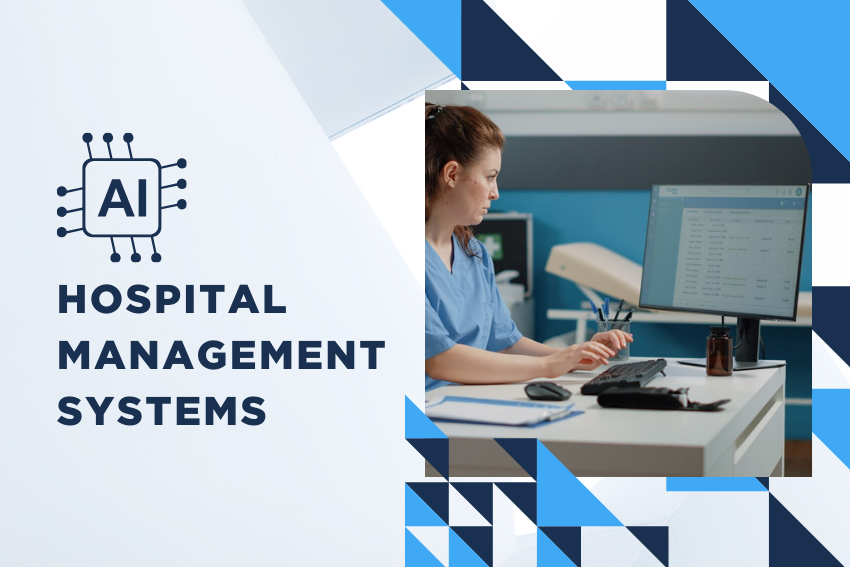Artificial Intelligence (AI) is transforming the healthcare industry by optimizing the effectiveness of hospital management systems, streamlining processes, and patient care. Since quality healthcare services are high in demand, AI-based solutions are transforming hospital operations and are well-structured, optimized, and patient-centric. Ranging from administrative process streamlining to resource usage optimization, AI is the leading solution to optimize inefficiencies and maximize service delivery in general.

In addition, AI streamlines the hospital waiting list system by reducing patient waiting times and the service workflow facilitation. Smart scheduling algorithms and virtual AI assistants assist hospitals to prioritize patients by severity, avoid overcrowding, and enhance patient satisfaction.
As technology advances, AI integration in hospital management systems will bring in even more game-changing solutions to make healthcare more efficient and patient-centric.
Knowledge of Hospital Management System
Hospital Management System, or HMS, is a computerized system meant to automate and consolidate hospital operations with the goal of making hospital operations efficient, less error-prone, and patient-oriented. It has various tasks such as admitting patients, assigning them appointments, billing them, managing stores, and documenting medical records into one system. By reducing human intervention to a minimum, an HMS maximizes hospital workflow, reduces errors, and optimizes the use of resources.
One of the significant advantages of an online hospital management system is accessibility. Cloud systems offer ease of access to patient records and hospital information by medical professionals from remote geographies with simple coordination between departments. The systems include data security through encryption and multi-level authentication to protect sensitive medical data.
Sophisticated features like AI-aided diagnosis, telemedicine care, auto-billing, and predictive analytics are included in Modern Hospital Management Systems. Integration with AI enables better decision-making by processing vast volumes of data, prediction of patient outcomes, and reduced hospital remissions. Web-based HMS solutions also enable efficient supply chain management to deliver medical equipment when required.
With the rise in demand for digitization in the health care industry, hospitals across the globe are implementing online hospital management system solutions in greater numbers to augment operational effectiveness. These systems are a part of contemporary health care, enhancing patient experience and ensuring that the hospital functions effectively while maintaining regulatory requirements.
AI in Hospital Administration
Artificial intelligence is changing hospital administration into greater efficiency, lower costs, and enhanced patient satisfaction. AI-powered solutions are automating and optimizing hospital operations, from staffing scheduling to billing.
1. AI for Staff Scheduling and Resource Planning
AI rationalizes hospital staffing schedules by predicting patient flow and allocating staff. It avoids burnout among health care professionals. AI-powered scheduling systems help hospitals in HMS in India maximize limited resources.
2. AI-Based Billing and Insurance Processing
AI handles medical billing with fewer human touches and faster processing and reduced human errors and processing time. Machine learning computer systems streamline insurance claims processing and fraudulent claim identification as well as policy adherence. The benefits of the hospital management system are faster payment and enhanced financial control.
3. AI for Supply Chain and Inventory Management
Hospitals are reliant on AI for inventory monitoring, never overstocked nor under-stocked. AI makes predictions on the demand from history to ensure life-saving drugs and equipment are available at all times. AI-controlled inventory for HMS in India avoids wastage and is cost-effective.
4. AI in Hospital Queue Management System
Artificial Intelligence waiting list management in hospitals reduces patient waiting time via intelligent scheduling of appointments. AI monitors real-time patient flow prioritizes cases based on urgency and maximizes processes. Virtual queuing, digital check-in, and automated reminders boost patient satisfaction.
5. AI for Operational Decision-Making
AI enables hospital administrators to make informed decisions based on data. Predictive analytics are used to forecast growth, monitor financial stability, and detect operating inefficiencies. AI-powered dashboards give real-time insights to support decision-making.
AI in Healthcare Data Management
Artificial intelligence is transforming healthcare data management by way of proper, efficient, and secure processing of patient information. Today, in hospitals, enormous amounts of data are being generated on a daily basis, from patient information to imaging reports. Artificial intelligence-based HMS in healthcare simplifies data management by reducing data entry, minimizing errors, and maximizing departmental interoperability.
The biggest benefit of AI in the management of medical information is HMS simplification in India, where hospitals are facing problems of dispersed storage and retrieval of information. AI systems consolidate electronic health records (EHR) together, and it is quite possible to view patient histories across various healthcare centers. This prevents redundant tests and enhances coordination among healthcare professionals, leading to better treatment outcomes.
Predictive analytics is another advantage of AI for the management of healthcare information. Machine learning software examines patient information to predict disease progression, readmission, and response to treatment. This not only helps doctors make the right decision but also helps hospitals optimize the utilization of resources. AI is also used more and more in medical imaging and diagnosis, where advanced algorithms scan X-rays, MRIs, and CT scans and detect abnormalities at high speed and accuracy.
Compliance and security are intrinsic to medical information processing, and AI augments such procedures with detection of outliers and protection against cyber-attacks. Patient privacy is assured via AI-enabled access controls and data encryption and by maintaining compliance with regulatory conditions in the health industry.
AI in HMS in the healthcare sector is not just data security and storage; it simplifies things, reduces paperwork, and allows health professionals to engage with patients more than paperwork. As HMS in India continues to expand even more, AI-driven solutions will be one of the prime drivers in changing the way hospitals store, analyze, and utilize medical information to provide better patient care.
AI for Patient Safety and Risk Management
AI is increasingly important to further improve patient safety and risk management in healthcare facilities. Predictive analytics and machine learning are applied by hospitals to detect possible risks, prevent medical mistakes, and enhance quality patient care. HMS utilizing AI in the healthcare industry maximizes monitoring, warns patients in real time, and automatically evaluates risks, preventing human error and improving patient outcomes.
One of the advantages of the hospital management system is that it can enhance drug safety. The AI-based systems cross-reference against the patient’s medical history, allergies, and medications being taken to prevent side effects from drug interactions. Computerized prescription verification prevents incorrect dose and drug administration, reducing adverse drug reactions.
AI also aids in infection control by analyzing hospital data to detect patterns of infection outbreaks. Monitoring in real time by AI-enabled clinic management systems allows healthcare providers to respond quickly to stop infections, introducing safety to patients. AI-enabled monitoring of hygiene also helps to ensure that hospital staff employees do not practice improper sanitation, preventing hospital-acquired infection.
Again, another of the strongest advantages of AI in patient safety is the constant monitoring performed by wearable and IoTs on the basis of sensors. These wearables are constantly tracking patients’ vital parameters and instantly providing alerts to physicians for possible critical changes in the patients’ condition. Predictive analytics by AI under HMS in healthcare assists in the identification of patients whose lives can be saved by timely intervention since they are going to die.
AI is also minimizing medical mistakes in the operating room. Robotic surgery maximizes precision, and decision-support systems with AI offer real-time feedback to surgeons, minimizing complications. Clinic management systems based on AI guarantee proper patient information, minimizing misdiagnosis and improving treatment accuracy.
By integrating AI into hospital and clinic management systems, health care organizations can decrease risk, enhance patient safety, and improve quality of care overall, thus constituting a significant area of hospital management system advantages.
AI in Remote and Telehealth Services
AI is revolutionizing the mode of telehealth and remote healthcare centers by conducting online consultations, remote monitoring, and e-health management. Increased demand for telemedicine, AI solutions enhance active patient engagement, correct diagnosis, and longer service provision. For hospital management system India, AI applications also increased the application of telehealth, particularly for rural and remote areas.
Smart virtual assistants and chatbots are the most effective benefits of AI in telemedicine. The AI systems provide patients with instant responses to their questions, arrange appointments, and permit symptom checking. Incorporating AI into an online hospital management system enables medical practitioners to deliver 24/7 virtual care, making the work of medical practitioners more convenient and increasing patient satisfaction.
Artificial intelligence plays a major role in patient monitoring remotely. IoT-based healthcare monitors and body sensors track live data of the patients, which includes heart rhythm, oxygen, and blood pressure. AI algorithms analyze this information and alert the doctors regarding any abnormality so that they could treat them at the right time and avoid re-admission into the hospital. AI-driven predictive analytics in India hospital management systems allow doctors to monitor chronic diseases patients remotely and provide timely treatment.
The second significant application of AI in telehealth is image-based diagnosis. Medical images like X-rays and MRIs are interpreted by AI-based software such that doctors are able to diagnose correctly from a distance. It fares especially well in rural clinics where specialist coverage is lacking.
Moreover, AI provides cybersecurity in hospital management systems online through secure communication of patient data and protection of confidential health data. AI-powered fraud detection acts as an impediment to illegal users and compliance with healthcare regulations.
Hospital management system India, along with AI becoming increasingly adopted in telemedicine and remote care, is simplifying the healthcare process, reducing costs, and providing quality medical treatment to patients worldwide.
Conclusion
Artificial intelligence transformed the healthcare industry in a manner that it was optimized, less costly, and better for the patient. From automating routine admin tasks to better diagnosis and patient safety, AI-based solutions are transforming hospital processes. Integrating AI with Hospital Management System led to decision-making with knowledge, better resource allocation, and improved quality of care for physicians as well as patients.
The most significant benefit of AI in hospital management is that it is capable of doing mundane work so that the doctors and nurses can use their time and energy for the patients with fewer documents and more care. Hospital Management System software using AI enables hospitals to automate scheduling, effectively manage medical records, bill and insure quickly. Additionally, disease prevention, patient risk stratification, and tailored treatment planning by predictive analytics driven by AI lead to improved health outcomes.
Further, AI allows for telemedicine and remote monitoring of patients to widen the accessibility of healthcare services to rural and poor communities. Virtual assistants, chatbots, and remote diagnostic tools based on AI allow patients to consult quickly without having to visit hospitals in person. AI enhances security through protection of patient data and adherence to regulations.
As AI technology evolves further, the Hospital Management System will be wiser, intelligent, and friendly to patients. The hospitals which incorporate AI technology will not just be operationally efficient, but the quality of the healthcare service will also increase, and patients and healthcare staff will be more satisfied.


